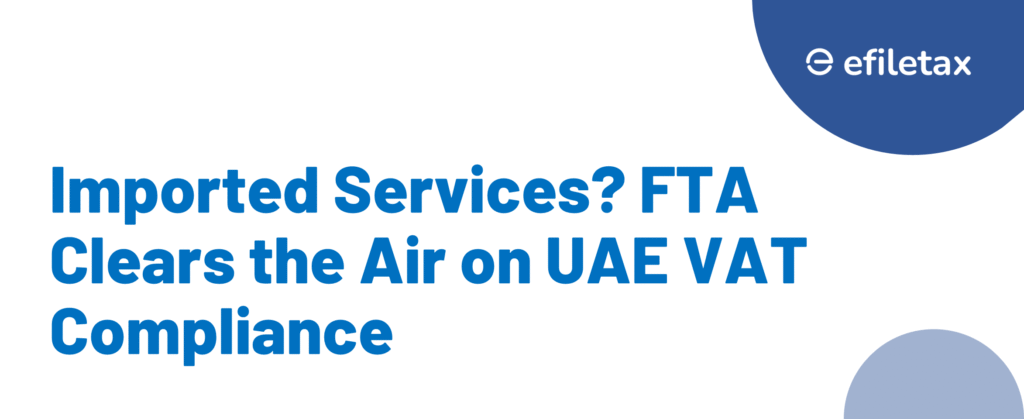
FTA Clarifies VAT on Imported Services What Indian Exporters Must Know
Introduction
For Indian exporters and service providers operating across borders, this clarification provides clarity on when VAT becomes applicable and who must account for it under the reverse charge mechanism. Here’s a simplified breakdown of the key takeaways and compliance implications.
What Does the FTA Clarification Cover?
The FTA’s guidance focuses on cross-border supply of services, especially those received from overseas providers. Key points include:
- Imported services are taxable at 5% VAT in the UAE.
- The reverse charge mechanism (RCM) applies to recipients based in the UAE.
- Non-resident suppliers not having a UAE VAT registration are not liable to collect VAT.
- UAE-based businesses must self-account for VAT on such services.
Why It Matters for Indian Exporters
Many Indian service exporters (consultants, IT firms, design services, etc.) supply digital or professional services to UAE clients. The FTA clarification affects them in these ways:
| Issue | Impact on Indian Exporters |
|---|---|
| UAE Client is VAT-registered | Indian exporter invoices without VAT; UAE client pays 5% VAT under RCM |
| Indian firm wrongly collects VAT | Not allowed unless registered in UAE |
| Non-resident supplier registration | Only mandatory if fixed establishment exists in UAE |
| Place of supply rules | Determined under UAE VAT Law, not Indian GST Law |
FTA’s Legal Basis
The clarification draws on the UAE VAT Decree Law (Federal Decree-Law No. 8 of 2017) and Cabinet Decision No. 52 of 2017 on the Executive Regulations. These establish that:
- Place of supply of imported services is where the recipient is located.
- Indian businesses do not need UAE VAT registration unless they meet a fixed establishment threshold
How to Stay Compliant
For Indian businesses exporting to UAE:
✅ Do not raise VAT invoices unless registered under UAE VAT
✅ Add clause in contract about RCM responsibility
✅ Keep proof of cross-border nature and client registration
✅ Maintain email/contract trail to show UAE as place of supply
Related Indian Compliance
Indian GST also applies a similar concept under Section 13 of the IGST Act, where the place of supply for cross-border services is outside India. Therefore:
- Such exports are zero-rated under GST
- Must be reported in GSTR-1 under Table 6A
- LUT (Letter of Undertaking) required to avoid IGST on export
📌 Read more: GST on Export of Services
FAQ on VAT on Imported Services
Q1. Do Indian freelancers need UAE VAT registration?
A: Not unless they have a fixed presence or ongoing establishment in the UAE.
Q2. Can I charge 5% UAE VAT from Dubai clients?
A: Else, the client pays VAT under RCM.
Q3. What documents should I keep for compliance?
A: Contracts, email confirmation, client VAT registration copy, and proof of cross-border supply.
Summary
FTA clarifies that VAT on imported services must be paid by UAE-based recipients under the reverse charge mechanism. Indian exporters need not register for UAE VAT unless they have a fixed base there. This simplifies invoicing and ensures Indian service providers remain compliant internationally.